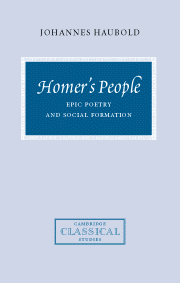Book contents
1 - Laoi in early Greek hexameter poetry
Published online by Cambridge University Press: 05 June 2014
Summary
The ‘discourse of the Greeks’ is a hypothetical construct with limited heuristic value. However, there are good reasons why it should be invoked here. As I have argued above, an uncontrolled proliferation of glosses has made the work of postwar Homeric critics increasingly difficult. Under such circumstances it seemed advisable to reintroduce some semantic clarity. Another reason why this study adopts a decidedly lexical approach is more specific to its task. Who early epic laoi are, what they do and suffer, hope and fear, has been lost to us even at the most basic level of understanding. We know so little about these people that every argumentative step needs to be developed carefully and in close contact with the texts. Finally, and most importantly, the word laos, in Homer and around Homer, constantly appears as a performed word. It is a deeply un-prosaic notion, endowed with a poetic–ritual force which we find stored in well-defined grammatical, metrical, semantic and social contexts. Here, if anywhere, attention to linguistic detail will be richly rewarded. This is not to suggest that something like the essence of laos may be found in a close description of the term alone. Homer's people are more than a sum total of lexical usages. They are dynamic, not static, in contact with neighbouring forms of human interaction as well as with the (unlimited) possibilities of their own existence over time and genre.
- Type
- Chapter
- Information
- Homer's PeopleEpic Poetry and Social Formation, pp. 14 - 46Publisher: Cambridge University PressPrint publication year: 2000



